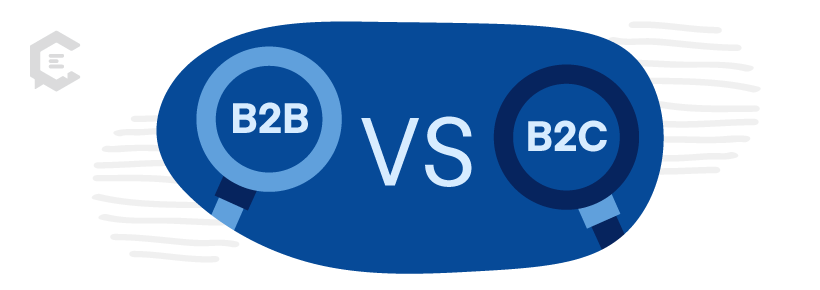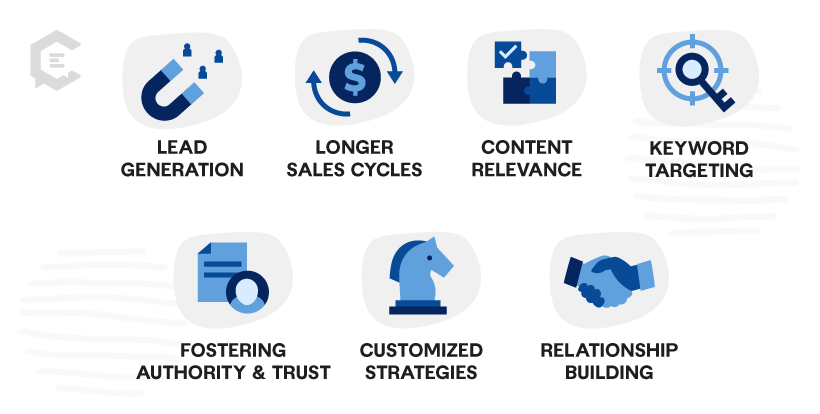Search engine optimization (SEO) has become a vital cornerstone for B2B (business-to-business) marketing strategies. It’s not merely a tool for enhancing visibility but a catalyst that can spark a chain reaction of opportunities.
B2B SEO is well-suited for attracting high-quality leads and fortifying your brand’s credibility regardless of your industry, product, or service. In this comprehensive guide, we step into the B2B SEO lab, unravel its distinct nuances, and outline winning strategies you can start using now.

Introduction to B2B SEO
Before going further, let’s clarify what B2B SEO is and how it differs from business-to-customer (B2C) SEO as well as general SEO.
What is B2B SEO?
B2B SEO is a specialized branch of digital marketing that focuses on optimizing a company’s online presence to attract and engage other businesses as potential customers.
Businesses often seek service providers or vendors to boost efficiency or address a specific challenge. B2B SEO strategies hone in on the people deciding which companies to partner with.

The Main Differences: B2B vs. B2C SEO
B2B and B2C SEO are two very different animals. Understanding how they’re unique makes it easier to devise a B2B-specific strategy.
Target audience
B2B SEO:
B2B SEO caters to a distinctly professional and corporate audience. Businesses in this space are typically looking for products or services that will streamline their operations, enhance productivity, or fulfill specific organizational needs. The target audience is often composed of decision-makers, procurement managers, or specialized professionals.
For example, a software development company offering an enterprise-level project management tool would target businesses seeking to improve team collaboration and efficiency.
B2C SEO:
B2C SEO, on the other hand, addresses individual consumers seeking products or services for personal use. The target audience is diverse and may include various demographics, interests, and purchasing behaviors.
For instance, an online clothing retailer may focus on reaching and engaging consumers looking for trendy clothing and fashion accessories. But they’re not necessarily trying to supply clothing for all a business’s employees.
Sales cycle
B2B SEO:
In the B2B space, the sales cycle tends to be longer and more complex. It involves research, evaluations, negotiations, and multiple decision-makers. Businesses are often looking for long-term partnerships, and the SEO strategy needs to support this extended buying process.
Consider a B2B SEO campaign for a cybersecurity firm. It may involve creating informative white papers, webinars, and case studies catering to security-conscious businesses’ needs. The goal is to establish trust and authority during the decision-making process.
B2C SEO:
In B2C, the sales cycle is typically shorter. Consumers often seek immediate solutions or products to fulfill their needs or desires. The focus is on making quick, one-time purchases.

The Importance of SEO in B2B Marketing
SEO is foundational to B2B marketing, especially because it bridges the gap between your target audience and your online presence. Here are some of the ways SEO and B2B marketing intersect:
- Lead generation: Both are primarily concerned with generating qualified leads for a business. The goal is to attract other businesses interested in the products or services offered by the B2B company.
- Longer sales cycles: B2B transactions often involve longer and more complex sales cycles. B2B SEO strategies are designed to nurture prospects and guide them through the decision-making process.
- Content relevance: Content must address other businesses’ specific needs, challenges, and pain points. It often includes detailed product or service information, industry-specific insights, case studies, and data-driven content.
- Keyword targeting: B2B SEO involves researching and targeting keywords relevant to the industry, specific to the products or services, and aligned with the language and terminology used in the business sector.
- Fostering authority and trust: Building authority and trust is crucial in B2B SEO. Establishing the business as an industry expert and a trustworthy partner is essential for success.
- Customized strategies: Strategies are tailored to suit the unique characteristics of the target audience. This includes considering the role of multiple decision-makers, addressing budget considerations, and adapting to the longer buying cycle.
- Relationship building: It’s not just about ranking high in search results; it’s also about building relationships. This may involve networking, partnerships, and outreach to other businesses.

Strategies for B2B SEO Success
An effective B2B SEO system uses some of the same techniques as B2C SEO, but the different audience and sales cycle makes B2B strategies unique.
Keyword research for B2B
Keyword research is the cornerstone of any successful SEO campaign. In B2B, it’s crucial to understand the keywords your target audience uses in their search queries. It’s best to conduct in-depth research to uncover high-value, relevant keywords. And don’t forget to separate them properly from your topics.
There’s no shortage of tools you can use for B2B SEO. Tools like SEMrush, Ahrefs, and Google Keyword Planner provide valuable insights into search trends and competition.
On-page optimization techniques
On-page optimization involves optimizing your website’s content, meta tags, headings, and internal linking. By creating well-structured, keyword-rich content, you can improve your website’s visibility and relevance.
In a B2B context, your on-page optimization decisions are based on what other businesses need to see. For instance, suppose you have a cutting-edge solution that solves a key business problem in a completely different way. You may choose to optimize the on-page experience of users by featuring:
- The technologies your solution uses
- The range of problems your offering can solve
- Case studies of businesses that have already benefitted from your solution
Even though this is very basic information, it would benefit your on-page strategy because it makes it easier for customers to envision how your offering works and how it can benefit them.
Link-building for B2B
In B2B SEO, you want to focus on acquiring high-quality backlinks from authoritative sources within your industry. Guest posting, content outreach, and building partnerships are effective strategies.
You can also incorporate news outlets and industry publications in your link-building strategy. This helps your search engine ranking while also keeping you top of mind for business leaders who read those publications.
Technical SEO best practices
Technical SEO is the backbone of your website’s performance. Ensure your website is well-structured, loads quickly, is mobile-friendly, and is free from technical errors that could hinder its search engine ranking.
For many companies, a mobile-first strategy factors into their technical SEO decisions. From a technical perspective, a mobile-first approach focuses on ensuring your content loads quickly, looks good, and is easy to navigate on mobile devices.

Role of Content in B2B SEO
Creating high-quality content using the most effective format truly sets B2B SEO apart from B2C.
Crafting quality B2B content
In your B2B SEO strategy, you want to create informative, value-packed content that addresses the pain points of specific kinds of businesses. This may sometimes involve focusing on a particular buyer in the business.
For instance, suppose you’ve developed software that automatically optimizes how factories produce their goods. In your B2B SEO strategy, you could include:
- White papers that explain how your solution creates efficiencies and why it’s so effective
- Case studies outlining a few examples of manufacturers that have already benefitted from your solution
- Blog posts that address how your solution addresses more specific pain points, such as long turnaround times and last-minute change orders
Content formats that resonate with B2B audiences
In B2B, long-form content like e-books and in-depth guides are highly effective. Infographics, webinars, and videos are also popular formats that resonate with B2B audiences.
This is because B2B buyers often have to explain why they chose to go with your company to other stakeholders. By providing longer-form content, you make it easier for them to explain, in detail, why your solution is the best.

Tools and Resources for B2B SEO
In addition to building a successful strategy, you can use specific tools to test its effectiveness and make adjustments.
Analytics and reporting
You can utilize analytics tools such as Google Analytics and Google Search Console to monitor your website’s performance. Track key metrics, identify areas for improvement, and adjust your SEO strategy accordingly.
Data-driven decision-making is a key aspect of B2B SEO. Analyzing performance metrics and reporting on ROI (Return on Investment) are essential to fine-tuning strategies.
SEO tools tailored for B2B
Consider using specialized B2B SEO tools like HubSpot, Marketo, or Moz Pro to streamline your efforts and gain insights specific to your industry.
For instance, Moz Pro crawls through your site to look for errors that could get in the way of impacting your business clients. It also tells you the kinds of links you can use to improve page performance. In addition, if you launch a content marketing campaign, Moz Pro can let you know whether or not it’s helping you hit your objectives.

B2B SEO Case Study: PropSream
PropStream provides intelligent real estate analytics and data to agents, investors, and brokers. Despite having a useful product, PropStream lacked the reach and voice needed to stand out as an authority in the real estate tech space.
After partnering with ClearVoice to put a B2B SEO strategy in play, PropStream established a firmer foothold in the industry. They also developed a voice that complemented the company’s brand image and marketing goals.
The Future of B2B SEO
B2B SEO is an indispensable component of modern marketing strategies. By aligning your SEO efforts with the unique dynamics of B2B transactions, you can drive qualified leads, establish brand authority, and stay ahead in the competitive landscape.
Keep an eye on emerging technologies like voice search, artificial intelligence, and changes in search engine algorithms. Staying adaptive and informed will be key to maintaining a competitive edge in the ever-evolving world of B2B SEO.
Whether you’re just getting started or already have many of the details in place, ClearVoice can help fine-tune your strategy and provide the expert-level content your business needs. Take advantage of ClearVoice’s years of success in B2B SEO with its managed content creation, and easily speak with a content specialist today.



